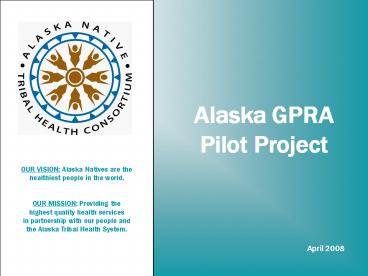Alaska GPRA Pilot Project - PowerPoint PPT Presentation
1 / 19
Title:
Alaska GPRA Pilot Project
Description:
FY 2004 Alaska submitted GPRA data (women's health and ... Multiple, independent EHRs. Limited staff resources. Accomplishments. GPRA awareness wide-spread ... – PowerPoint PPT presentation
Number of Views:50
Avg rating:3.0/5.0
Title: Alaska GPRA Pilot Project
1
Alaska GPRA Pilot Project
OUR VISION Alaska Natives are the healthiest
people in the world. OUR MISSION Providing the
highest quality health services in partnership
with our people and the Alaska Tribal Health
System.
April 2008
2
AK GPRA Pilot Project Team History
- Operational since 2000
- FY 2004 Alaska submitted GPRA data (womens
health and diabetes) to HIS - FY 2005, 2006, 2007 all national indicators
- Focus on data quality
- Initially womens health and diabetes
- Expanded focus to entire data generation process
for all indicatorsincluding non-GPRA clinical
indicators such as medicine education and
diabetes prevalence
3
AK GPRA Pilot Project Sites
- Original Members (2000)
- Alaska Native Medical Center (ANMC)
- Bristol Bay Area Health Corporation (BBAHC)
- Maniilaq Association
- Southeast Alaska Regional Health Consortium
(SEARHC) - Tanana Chiefs Conference (TCC)
- Yukon Kuskokwim Health Corporation (YKHC)
4
Team Growth
- New Members (2005)
- Chugachmiut
- Council of Athabascan Tribal Governments (CATG)
- Eastern Aleutian Tribes (EAT)
- Ketchikan Indian Community (KIC)
- Kodiak Area Native Association (KANA)
5
Continued Growth
- New Members (2007-2008)
- Annette Island Service Unit (AISU)
- Aleutian Pribilof Islands Association (APIA)
- Yakutat
- Hoonah
6
Collaborations
- Associate GPRA Team Members
- ANTHC Epi Center
- Alaska Immunization Program
- Diabetes Audit Program
- ANTHC Tobacco Cessation Program
7
(No Transcript)
8
Our Focus
- Tribal Leader Confidence
- Intra-Tribal Policy Agreement on Propriety
Security of Data - Process in Place to Ensure Data Integrity
- Agreement Authorizing Tribal Aggregate Reporting
to OMB - Respect for Tribal Sovereign Rights and
Recognition of Volunteer Participation
9
Focus Teamwork!
- Development of a Strong Inter-Tribal Network on
Performance Reporting - All Disciplines Involved Engaged at Local Pilot
Sites (education orientation in real applicable
terms) clinical, administrative, support - Data Integrity Clean-up
- Consistent Approach to Data Capturing Reporting
- Utility and Applicability of reports with tie-in
to local performance initiatives other internal
external reporting requirements - Demonstrate Tribal Success to IHS Congress
10
Our Approach
- Decentralize Effort to Service Unit Level
- Qtrly Networking Meetings of Pilot Project Team
teleconferences - Annual Statewide Multi-disciplinary GPRA
Orientation/Training Face-to-face Technical
Support Consultation on National Measures - Connect Efforts to Budget Formulation
- Annual report to Tribal Health Leadership of GPRA
results progress reports to Alaska Tribal
Caucus - Develop Incentives Recognition Awards
- Planning Best Practices conference
11
Barriers
- Tribal Leadership turnover
- Pilot project status
- Uncertainty/rumors of future IHS/Tribal
commitment to RPMS - Multiple, independent EHRs
- Limited staff resources
12
Accomplishments
- GPRA awareness wide-spread
- Increasing of sites reporting
- Engaged in Annual Tribal Consultation at state
national level - National GPRA measures input
- new Meth Amphetamines Measure
- Sexual Assault measure
- Strong Network Pilot Project Team expanded
Associated membership participation
13
Accomplishments
- Demonstrated impact on national results, i.e.,
pap smear rate - Developed statewide capacity to conduct Data
Quality Assessments follow-up - Developed user-friendly templates of measure
results that are used by other sites - Established inter-Tribal Data Sharing Matrix
Policy Input into National GPRA measures - Engaged in 1-on-1 dialogue _at_ national level
14
Accomplishments
- Introduced integration of GPRA into Budget
Formulation Process - On State-wide Tribal Leaders Agenda
- Field clinical program staff are actively
consulting on GPRA measures/processes at every
pilot site - Awards Program friendly competition
- Dashboards on radar of Tribal organizations for
Tribal measure of successful performance - Generated excitement and value-added processes at
pilot sites
15
Our Vision
- Focus on Continuous Efforts to Improve Health
Status of Alaska Natives/American Indians - Tribes will be an integral valued player with
ownership in process product - Input into GPRA measures
- Friendly competition for successful results
- Reporting System of Reporting will be valued as
a vital part of day to day operations
incorporated into organizational performance
dashboards and Key staff performance evaluations - Strong collaboration true partnership with the
IHS other Tribes for maximum national impact - Successes will be rewarded locally nationally
- Support systems will be in place to achieve
success
16
Our Future
- Expand Tribal Participation
- Data Quality / GPRA Review site visits
- High Visibility of Performance Outcomes
Friendly Competition - Establish GPRA certification program
- Enhance provider involvement thru elevating
process to CMO level participation in statewide
Provider conference - Solidifying access to GPRA reporting tools RPMS,
CRS, NDW - Alaska is national leader in Tribal GPRA
initiative - Strong Partnership with IHS Tribes on
Performance Evaluation
17
Our Promise
- Advocate the importance of Tribal health
performance reporting _at_ national level - Commit to education of Tribal leaders,
providers, all staff on benefits impact - Provide quality data results recommend
improvements at local, statewide national
levels - Provide vehicle for Tribal voices in the process
- Support new sites proactively seeking
participation solutions - Be available for consultation when IHS goes to
Secretary OMB to advocate on behalf of Tribes
- Provide a foundation to increase health services
to AI/AN by focusing on performance meaningful/
usable clinical measures that correlate directly
to Tribal goals - Be RESPONSIVE, PRO-ACTIVE, FLEXIBLE VOCAL on
Health Performance Improvements!
18
Thank You!Unalaska Russian Orthodox Church,
Alaska
19
Karol DixonHealth Programs AdministratorAlaska
Native Tribal Health ConsortiumHealth
Statistics4000 Ambassador DriveAnchorage AK
99508(907) 729-2879 (direct)(907) 729-3666
(fax)http//www.anthc.org/ref/hskldixon_at_anthc.o
rg































